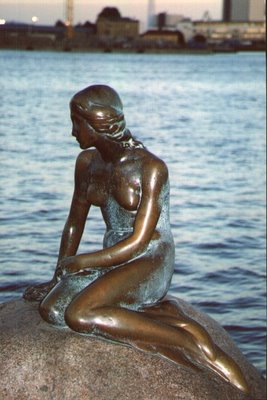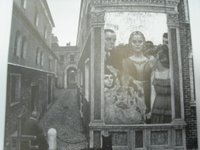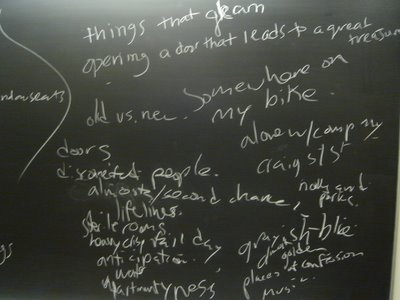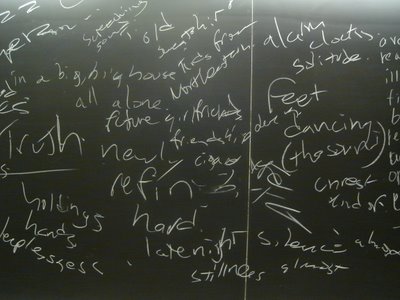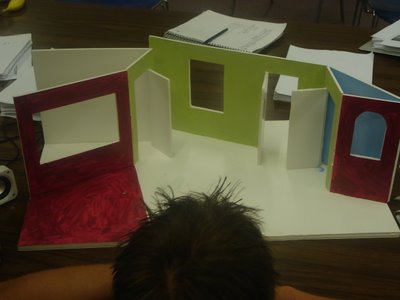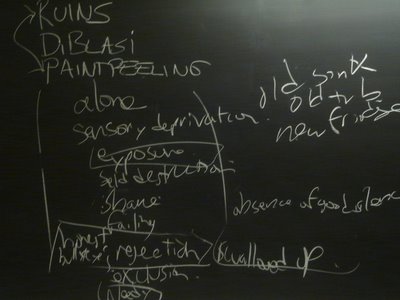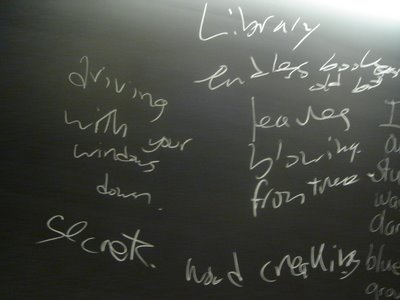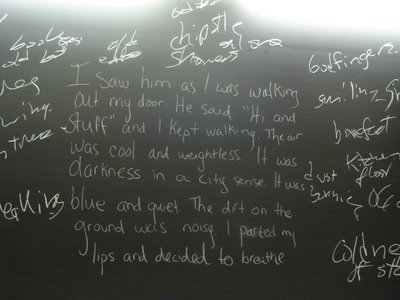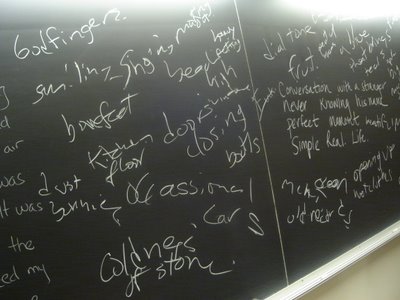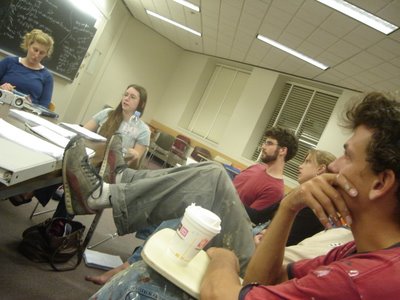Video footage from rehearsal last night. These are the clips. This is a test post. Still working out the kinks in viewing them...
Laughter
Thomas Scene
Thomas and Erin
Planting
Further
Tuttle and T-Bone Talk
Freedom
Tuesday, August 29, 2006
Week 2 Begins
After a week of table work, we started getting on our feet. It worked out that I was sitting behind Brian so I could document some really eye-opening direction and see the perspective from the director's point of view. Here are some images from rehearsal. Click to enlarge.
I also filmed some footage with my camera which came out amazingly well. I can e-mail if interested - I can't post movie files to the blog but if I could upload them to another site and create a link here, I would. Looking into it. Google has a beta program for movie uploads - that may work.
A thought occurred to me - it seems that a lot of people in Boston in their 20's smoke. I wondered if any of these characters would. The group thought maybe, maybe, Matt, but perhaps only in a party atmosphere. Brian suggested I research it and sure enough there is evidence of a trend in quitting.
Nearly 65% of smokers ages 16-24 tried to quit smoking during the previous year, according to results from the National Youth Smoking Cessation Survey, a two-year, longitudinal study of more than 2,500 smokers aged 16-24, were presented at the 13th World Conference on Tobacco OR Health Conference in Washington, D.C. Smokers whose parents smoked were half as likely to quit smoking as those with a parent who either had quit or had never smoked.
The blog will be on vacation this week. In the next 2 days at night I have to get fully moved from my North End apartment to Somerville and then Thursday I fly to Philly and drive from there to Virginia for a sibling gathering at my brother's vacation home over an extended Labor Day weekend. Happy laboring all.
I also filmed some footage with my camera which came out amazingly well. I can e-mail if interested - I can't post movie files to the blog but if I could upload them to another site and create a link here, I would. Looking into it. Google has a beta program for movie uploads - that may work.
A thought occurred to me - it seems that a lot of people in Boston in their 20's smoke. I wondered if any of these characters would. The group thought maybe, maybe, Matt, but perhaps only in a party atmosphere. Brian suggested I research it and sure enough there is evidence of a trend in quitting.
Nearly 65% of smokers ages 16-24 tried to quit smoking during the previous year, according to results from the National Youth Smoking Cessation Survey, a two-year, longitudinal study of more than 2,500 smokers aged 16-24, were presented at the 13th World Conference on Tobacco OR Health Conference in Washington, D.C. Smokers whose parents smoked were half as likely to quit smoking as those with a parent who either had quit or had never smoked.
The blog will be on vacation this week. In the next 2 days at night I have to get fully moved from my North End apartment to Somerville and then Thursday I fly to Philly and drive from there to Virginia for a sibling gathering at my brother's vacation home over an extended Labor Day weekend. Happy laboring all.
Friday, August 25, 2006
Day 4 Table Work
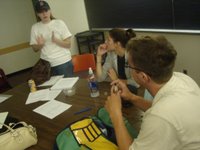 The discussion centered around the actors' persectives on their characters' different worlds. It was awesome that Brian was able to conference in Benji from Ohio who is cast as Erin's boyfriend, Matt, and have him on cellular speakerphone to share his thoughts on their relationship. Benji arrives in September. His thoughts were very much in line with ours. We discussed the roles of Marie, Beth and Margaret and then set out to do some character body work and a brief improv.
The discussion centered around the actors' persectives on their characters' different worlds. It was awesome that Brian was able to conference in Benji from Ohio who is cast as Erin's boyfriend, Matt, and have him on cellular speakerphone to share his thoughts on their relationship. Benji arrives in September. His thoughts were very much in line with ours. We discussed the roles of Marie, Beth and Margaret and then set out to do some character body work and a brief improv.
I took a photo for the press packet showing Beth and Erin. They capture the tone of the play very well at this point in time. Click to enlarge photo.
Melissa brought up the squirrels on the Boston Common and how they run around trees as children chase them, seeming to know it's a game, and eat from people's hands. She also mentioned a strange creature that was spotted in Boston but not from this region.
More talk of the list of the ordinary vs. the bizarre, the unnoticed vs. the noticed, for a dramaturgical insert to the program. Interesting concept came up the day before of putting the programs like scrolls in bottles with a little sand in them, and I wrote Tim the designer on Brian's suggestion to see if he could secure a bunch of bottles in his travels.
We discussed another manatee siting in Cape Cod and we speculated if it was the same one that was in the Hudson River 3 weeks ago. Associated Press news reports say "It is not known whether the manatee is the one seen earlier this month near Manhattan Island in New York. That manatee was tracked as it swam north along the coasts of Delaware, Maryland and New Jersey."
Thursday, August 24, 2006
As For Comedy

In the arena of comedy, Woody Allen's name came up and his style and character used as a discussion point for the role of Thomas. His commentary on comedy can be found at http://www.emusic.com/album/10603/10603983.html - track 3 "Stage Persona" is particularly interesting. These are not comedy routines. They are his insights on comedy and how people receive it.
John Coltrane

The significance of jazz and comedy came up last night and I found a bit of John Coltrane that evokes a sort of autumnal, directionless milieu. It's called Stardust and can be heard at http://www.emusic.com/album/10603/10603736.html - track 1 - simply click the Listen icon for a sample.
Manatees and Mermaids
Discussion on the feather at the opening of the play and paralleled to the manatee which is linked to mermaids according to Wikipedia. A discussion of mermaids, how the play's characters never utter the word mermaid. So the audience will never truly know. I shared an image of a bronze statue in Copenhagen of The Little Mermaid. Brian wants to use it as the model for the sculpture in the play.
Avoid the expected interpretation. What is expected?
New addition to the end with Marie being the name on the neighbor's mail. The old woman neighbor nobody ever noticed. The mail that Thomas got and never gave to her.
The idea of a dramaturgical insert for the program. Ask the cast for a list of the ordinary and compile this list but intersperse it with the unexpected, the miraculous. Like the manatee. As for the manatee...
I heard about in the Hudson River. Why would a salt water mammoth creature venture so far north out of his normal habitat (Florida, Virginia usually the northernmost) to explore the Hudson? Here's the article from CNN and another from the New York Times...
CNN: Accidental tourist: Manatee cruises Hudson River
Monday, August 7, 2006; Posted: 9:45 a.m. EDT (13:45 GMT)
NEW YORK, New York (AP) -- In the heat of summer, all sorts of tourists head north to cooler climes. This year, a manatee has joined the crowd, cruising past the nightclubs of Manhattan and continuing north.
The massive animal has been spotted in the Hudson River at least three times in the last week -- first off the Chelsea and Harlem sections of Manhattan, then to the north in Sleepy Hollow in Westchester County.
"It was gigantic," said Randy Shull, who said he spotted the unusual visitor Sunday afternoon while boating at Kingsland Point Park in Sleepy Hollow. "When we saw it surface, its back was just mammoth."
Last month, trackers saw the manatee as it swam north, first near Delaware, then Maryland, then New Jersey. By Saturday, it was seen in Manhattan.
Kim Durham, rescue program director for the Riverhead Foundation, a nonprofit group devoted to marine mammals, called it a "bona fide" sighting, but there isn't photographic proof.
It is unusual for one of the creatures -- often associated with the warm waters of Florida -- to travel so far north, although they have been reported along the shores of Long Island and even Rhode Island.
Manatees are an endangered marine mammal. Florida wildlife experts counted 3,116 in their annual survey in February.
John Vargo, the publisher of Boating on the Hudson magazine, said his alert about the sightings was met with disbelief by some boaters.
"Some were laughing about it, because it couldn't possibly be true," he said.
"I'm 70 years old, and I've been on the river my entire life," Vargo said. "I've seen dolphins and everything else, but never a manatee."
Other articles online:
New York Times: Massive Manatee Is Spotted in Hudson River By JENNIFER 8. LEE Published: August 7, 2006
Avoid the expected interpretation. What is expected?
New addition to the end with Marie being the name on the neighbor's mail. The old woman neighbor nobody ever noticed. The mail that Thomas got and never gave to her.
The idea of a dramaturgical insert for the program. Ask the cast for a list of the ordinary and compile this list but intersperse it with the unexpected, the miraculous. Like the manatee. As for the manatee...
I heard about in the Hudson River. Why would a salt water mammoth creature venture so far north out of his normal habitat (Florida, Virginia usually the northernmost) to explore the Hudson? Here's the article from CNN and another from the New York Times...
CNN: Accidental tourist: Manatee cruises Hudson River
Monday, August 7, 2006; Posted: 9:45 a.m. EDT (13:45 GMT)
NEW YORK, New York (AP) -- In the heat of summer, all sorts of tourists head north to cooler climes. This year, a manatee has joined the crowd, cruising past the nightclubs of Manhattan and continuing north.
The massive animal has been spotted in the Hudson River at least three times in the last week -- first off the Chelsea and Harlem sections of Manhattan, then to the north in Sleepy Hollow in Westchester County.
"It was gigantic," said Randy Shull, who said he spotted the unusual visitor Sunday afternoon while boating at Kingsland Point Park in Sleepy Hollow. "When we saw it surface, its back was just mammoth."
Last month, trackers saw the manatee as it swam north, first near Delaware, then Maryland, then New Jersey. By Saturday, it was seen in Manhattan.
Kim Durham, rescue program director for the Riverhead Foundation, a nonprofit group devoted to marine mammals, called it a "bona fide" sighting, but there isn't photographic proof.
It is unusual for one of the creatures -- often associated with the warm waters of Florida -- to travel so far north, although they have been reported along the shores of Long Island and even Rhode Island.
Manatees are an endangered marine mammal. Florida wildlife experts counted 3,116 in their annual survey in February.
John Vargo, the publisher of Boating on the Hudson magazine, said his alert about the sightings was met with disbelief by some boaters.
"Some were laughing about it, because it couldn't possibly be true," he said.
"I'm 70 years old, and I've been on the river my entire life," Vargo said. "I've seen dolphins and everything else, but never a manatee."
Other articles online:
New York Times: Massive Manatee Is Spotted in Hudson River By JENNIFER 8. LEE Published: August 7, 2006

Discussion on who opens as the unnoticed and who is revealed as the unnoticed. Click on image to enlarge.
Discussion on the purpose of a role like Margaret. Provides perspective. Serves as witness. Click on image to enlarge.
An image from a book that Mel brought to rehearsal, The Lucid Dreamer by Malcolm Godwin. Observation: very different people crowded into a place with a disproportionately sized would around them. Click on image to enlarge.
Wednesday, August 23, 2006
Tuesday, August 22, 2006
Temporary Streams
We had the read-through last night. The cast is phenomenal. The play is full of possibilities. The story is engrossing. The first act ran 50 minutes. The second ran about 80 minutes. Not bad. There were some areas that could possibly be cut, but it would be premature to conceive of cuts. I did bring up the question of what purpose my character and her two scenes serve to the story. Brian agreed.
I am excited to see this work unfold. But other than my own character analysis, analyzing the rest of the text, and researching aspects of the story, mermaids for instance, what is my dramaturgical job in the rehearsal process?
I look to a piece as published in the 10.1, 1978 issue of Theatre at Yale and republished in Dramaturgy in American Theater. I like this piece because it reinforces what a great learning experience this is for me to work with friends in the mounting of a new play and bring not just bring my desire to learn dramaturgy but also my desire to help see my friends flourish. It is the perfect storm. And by storm, I mean something beautiful that raises our stakes and makes us wrestle with two diametrically opposed extincts - one to at once run and seek cover, and two to jump and splash and dance in puddles and temporary streams and be soaked and remember what we were like as children experiencing nature without worrying about exposing ourselves to the risk of pain and death.
I hope this experience will mean running through temporary streams of consciousness, experiencing the nature of life, not worrying about the risks we take as we expose ourselves as artists and as friends.
Here's the piece, an excerpt really, by Mira Rafalowicz, with credits too long to type:
people ask me what I do in the theatre.
this is a selection from my list of answers:
an internal critic
an intimate participant
an outspoken audience member
a collaborator
an extra eye
I work in dialogue with the director and the writer(s),
I help asking questions and finding doubts.
the questions are essential, answers and solutions
are part of the end of a process. we don't always find them.
I give my opinion about just about everything.
People either listen to my advice, my opinions,
or they don't.
...
as a dramaturg I am limited in whom I can work with.
I can help make something better, clearer, only
when the basic working relationship is one of
mutual respect. Not uniformity of thinking and
feeling (there is no creative dialogue possible
in uniformity, total agreement), but a basis of
sympathy. Ideally with everyone involved in the process.
So I can really only work with friends. When I run
out of friends to work with in the theatre, I
will do something else.
As Robert Brustein (founder, Yale Repertory Theatre and ART) states:
The more deeply engaged dramaturgs are in the process of production, the more generally accepted they are by colleagues and collaborators. It would seem, therefore, that the most delicate and difficult function of all remains that of internal critic - finding a way to communicate views without arousing defensiveness - which requires extraordinary discretion but is a necessary, indeed a critical aspect of the job, and can be accomplished as long as the dramaturg is seen as concerned with improvement rather than vanity or ego.
To that end, a quote of the day I receive today as part of my daily emails traffic says:
"A great attitude does much more than turn on the lights in our worlds; it seems to magically connect us to all sorts of serendipitous opportunities that were somehow absent before we changed." - Earl Nightingale1921-1989, Author and Radio Personality
That's pretty much it.
I am excited to see this work unfold. But other than my own character analysis, analyzing the rest of the text, and researching aspects of the story, mermaids for instance, what is my dramaturgical job in the rehearsal process?
I look to a piece as published in the 10.1, 1978 issue of Theatre at Yale and republished in Dramaturgy in American Theater. I like this piece because it reinforces what a great learning experience this is for me to work with friends in the mounting of a new play and bring not just bring my desire to learn dramaturgy but also my desire to help see my friends flourish. It is the perfect storm. And by storm, I mean something beautiful that raises our stakes and makes us wrestle with two diametrically opposed extincts - one to at once run and seek cover, and two to jump and splash and dance in puddles and temporary streams and be soaked and remember what we were like as children experiencing nature without worrying about exposing ourselves to the risk of pain and death.
I hope this experience will mean running through temporary streams of consciousness, experiencing the nature of life, not worrying about the risks we take as we expose ourselves as artists and as friends.
Here's the piece, an excerpt really, by Mira Rafalowicz, with credits too long to type:
people ask me what I do in the theatre.
this is a selection from my list of answers:
an internal critic
an intimate participant
an outspoken audience member
a collaborator
an extra eye
I work in dialogue with the director and the writer(s),
I help asking questions and finding doubts.
the questions are essential, answers and solutions
are part of the end of a process. we don't always find them.
I give my opinion about just about everything.
People either listen to my advice, my opinions,
or they don't.
...
as a dramaturg I am limited in whom I can work with.
I can help make something better, clearer, only
when the basic working relationship is one of
mutual respect. Not uniformity of thinking and
feeling (there is no creative dialogue possible
in uniformity, total agreement), but a basis of
sympathy. Ideally with everyone involved in the process.
So I can really only work with friends. When I run
out of friends to work with in the theatre, I
will do something else.
As Robert Brustein (founder, Yale Repertory Theatre and ART) states:
The more deeply engaged dramaturgs are in the process of production, the more generally accepted they are by colleagues and collaborators. It would seem, therefore, that the most delicate and difficult function of all remains that of internal critic - finding a way to communicate views without arousing defensiveness - which requires extraordinary discretion but is a necessary, indeed a critical aspect of the job, and can be accomplished as long as the dramaturg is seen as concerned with improvement rather than vanity or ego.
To that end, a quote of the day I receive today as part of my daily emails traffic says:
"A great attitude does much more than turn on the lights in our worlds; it seems to magically connect us to all sorts of serendipitous opportunities that were somehow absent before we changed." - Earl Nightingale1921-1989, Author and Radio Personality
That's pretty much it.
Friday, August 18, 2006
Too Much Or Not Enough
Yesterday the flow of 11:11 and the focus on The Unnoticed changed abruptly when I heard that Andre Dec passed away suddenly. He was 30 or thereabouts. Andre was one of our actors from The Autumn Hours, Brian's play about life and love. We never knew Andre very well. I talked with him during rehearsals now and then. He was one of the gang in the way casts bond for a production but don't necessarily make lifelong friends. I went to an audition in Somerville 3 weeks ago for The Margaret Ghost and Andre auditioned too. He was good. I reckoned he'd get cast in the show. We chatted after and I promised to return his CD finally, the one we used in The Autumn Hours. He gave me his cell, I called it so he had mine, and we said bye. So now we move along? No fanfare. No memorial. The services are in another state somewhere. Someone in the cast suggested a reunion performance dedicated to Andre. The thought resonated with a few people. But it's probably not going to happen. Why? Maybe it's too much. Maybe it's too little. So that's all. Does a dramaturg get involved if a company is going to choose to present a special performance in memory of a deceased, young actor that was once a part of the group? I don't know. But I thought it bears recording insomuch as it could influence the atmosphere for a while, and insomuch as I couldn't ignore its influence in general.
Thursday, August 17, 2006
The Super Picture
Hung out with Brian and Greg last night and did a lot of catching up and envisioning. 11:11 has a new 5-play season structure. Aggressive for a young theatre company in Boston. Excluding summer, that's one production every 8 weeks. Will Boston audiences, aside from friends and family, want to see one company's work every two months? Can a company structure that is based on a barter system of serve-the-company and grow-as-an-artist support such a schedule?
In the year I've been away from the company, a lot has happened. There is now more support - monetary, artistic, technical - and there is less groping for space. Doors are opening more.
Brian embarks on grad school at BU next year. That too is probably going to mean more exposure, more growth, a greater scope.
The season begins with The Unnoticed at the Devaughnan. There are two 2-week slots at the BCA in March and May, Brian said. He plans to do Where the Lost Boys Go and the musical. The theme is "magic" and so we discussed the script Neverland which I so wanted to produce for the slot I got at the BCA the first 3 weekends in April. Greg felt that Neverland was too great a risk for a first go at producing and we eventually found and were thrilled to choose Dancing at Lughnasa, which I plan to dramaturg and play the role of Agnes.
But a huge part of my heart still holds a dream for Neverland to enjoy its Boston premiere, if not with Way (the group I started to secure the BCA and future slots for some dream projects). And I pitched the play to Brian for 11:11 to consider for this season if there is a slot or the next. He asked to see the play. I shall e-mail him the first half I got online and give him the play at the first Unnoticed rehearsal next week. Greg brought up issues with Neverland which he hadn't voiced before, perhaps because he knew how much I saw potential in it. He had said it could be a good second year play to produce, but not for our first project. This time he mentioned the character archs. Good points. I'm not sure I totally see what he saw. It will be good to see what Brian thinks. If 11:11 could produce it, I would be so excited for the audiences and the playwright.
So I have the context of the bigger picture now. The Super Picture as I call it. Brian said The Unnoticed has a lot of dramaturgical possibilities. Like mermaid research, he said. I also see possibility in the characters' backgrounds. The context of a culture that embraces communal isolationism as its default in an apartment shared by 3 individuals. I think starting high level and then zooming in on the various pieces is the best approach. We shall see!
In the year I've been away from the company, a lot has happened. There is now more support - monetary, artistic, technical - and there is less groping for space. Doors are opening more.
Brian embarks on grad school at BU next year. That too is probably going to mean more exposure, more growth, a greater scope.
The season begins with The Unnoticed at the Devaughnan. There are two 2-week slots at the BCA in March and May, Brian said. He plans to do Where the Lost Boys Go and the musical. The theme is "magic" and so we discussed the script Neverland which I so wanted to produce for the slot I got at the BCA the first 3 weekends in April. Greg felt that Neverland was too great a risk for a first go at producing and we eventually found and were thrilled to choose Dancing at Lughnasa, which I plan to dramaturg and play the role of Agnes.
But a huge part of my heart still holds a dream for Neverland to enjoy its Boston premiere, if not with Way (the group I started to secure the BCA and future slots for some dream projects). And I pitched the play to Brian for 11:11 to consider for this season if there is a slot or the next. He asked to see the play. I shall e-mail him the first half I got online and give him the play at the first Unnoticed rehearsal next week. Greg brought up issues with Neverland which he hadn't voiced before, perhaps because he knew how much I saw potential in it. He had said it could be a good second year play to produce, but not for our first project. This time he mentioned the character archs. Good points. I'm not sure I totally see what he saw. It will be good to see what Brian thinks. If 11:11 could produce it, I would be so excited for the audiences and the playwright.
So I have the context of the bigger picture now. The Super Picture as I call it. Brian said The Unnoticed has a lot of dramaturgical possibilities. Like mermaid research, he said. I also see possibility in the characters' backgrounds. The context of a culture that embraces communal isolationism as its default in an apartment shared by 3 individuals. I think starting high level and then zooming in on the various pieces is the best approach. We shall see!
Wednesday, August 16, 2006
New Beginnings
Greetings! This BLOG is to serve as the production dramaturg's casebook for The Unnoticed (11:11 Theatre Company's September 2006 production). Over the coming weeks, I plan to post notes, photos of pertinent images to the play and photos of the rehearsal process, my own personal research, and any other information that might serve to complete the journal. This casebook is primarily for me to document and learn but I enthusiastically welcome you to take in whatever images and words appear here. I begin the journal with a brief introduction and background.
Introduction
This week Brian Tuttle offered me the position of Production Dramaturg for 11:11's most recent work, The Unnoticed. I had explained how much I've been wanting to explore this aspect of theatre, and since he offered me the role of Margaret Olsen, a part small enough to let me act and do dramaturgical work, I knew it would be a fulfilling and mutually beneficial experience.
Brian and I have been friends and cohorts for several years ever since he moved to Boston from Ohio. I have had the pleasure of acting in five of his plays with 11:11 Theatre Company and managing marketing, public relations and web design during its first two years in Boston. I share a passion with him to see magic on stage and share that with audiences. I see a talent in him that makes me want to celebrate. I wanted to promote these things, and I did with great satisfaction that the company would flourish. In my final months of marketing, I had the joy of seeing the Boston Globe place 11:11 "on the watch list as a creator of interesting theater in Boston" (July 20, 2005).
It has been a wild and exciting ride, these past few years in Boston's new theatre scene and one I can always cherish for the bonds built and the fruit produced. I have experienced good things and met phenomenal people. The only thing that I suspected missing for me was a certain sense of my skills extending beyond the stage, beyond the webmastering, beyond public relation e-mails to press and theatre folks, and beyond my limited scope to a deeper level. I suspect dramaturgy may be that level. And so this is an experiment of sorts to test that hypothesis. To quote Delirious: "I wanna go deeper but I don't know how to swim."
Kindly bear with me as I learn.
Julie
p.s. Below are excerpts I think help summarize the role of dramaturgy from the book Dramaturgy in American Theatre:
The dramaturg’s role in theatre is one who “looks out for the play itself… who keeps the whole in mind.”
We expect the dramaturg “to find answers to questions posed by actors, designers, directors and audience members” regarding a specific play.
The question a dramaturg must ask, “What is keeping me from a full understanding of this play?”
Some of the best work a dramaturg performs “occurs when [s/he] brings dozens of pictures to rehearsals.”
“Negotiating the working relationship [with the director] is perhaps the most crucial element in ... dramaturgical work.”
A dramaturg writes program notes, study guides, press releases, and newsletters. S/he speaks to audiences and facilitates discussions among actors, directors, designers, playwrights and audiences.
“Some of the best dramaturgs are actors, directors, designers, playwrights and producers, even though they might not use this word to describe what they do... Dramaturgy might be performed by an individual or by an entire production ensemble.”
It is obvious that a dramaturg wears many hats! As a professional, s/he must know theatre history, dramatic literature, theory and criticism, research methods, interpersonal communication, collaborative skills, public relations, the whole range of the liberal arts, as well as exposure to and intensive experience in theatre making.
"As the humanist in the woodpile, it is the dramaturg who must act as the conscience of the theatre, reminding it of its original promise, when it threatens to relax into facile, slack and easy paths."
- Robert Brustein, founding director of the Yale Repertory and American Repertory Theatres
Introduction
This week Brian Tuttle offered me the position of Production Dramaturg for 11:11's most recent work, The Unnoticed. I had explained how much I've been wanting to explore this aspect of theatre, and since he offered me the role of Margaret Olsen, a part small enough to let me act and do dramaturgical work, I knew it would be a fulfilling and mutually beneficial experience.
Brian and I have been friends and cohorts for several years ever since he moved to Boston from Ohio. I have had the pleasure of acting in five of his plays with 11:11 Theatre Company and managing marketing, public relations and web design during its first two years in Boston. I share a passion with him to see magic on stage and share that with audiences. I see a talent in him that makes me want to celebrate. I wanted to promote these things, and I did with great satisfaction that the company would flourish. In my final months of marketing, I had the joy of seeing the Boston Globe place 11:11 "on the watch list as a creator of interesting theater in Boston" (July 20, 2005).
It has been a wild and exciting ride, these past few years in Boston's new theatre scene and one I can always cherish for the bonds built and the fruit produced. I have experienced good things and met phenomenal people. The only thing that I suspected missing for me was a certain sense of my skills extending beyond the stage, beyond the webmastering, beyond public relation e-mails to press and theatre folks, and beyond my limited scope to a deeper level. I suspect dramaturgy may be that level. And so this is an experiment of sorts to test that hypothesis. To quote Delirious: "I wanna go deeper but I don't know how to swim."
Kindly bear with me as I learn.
Julie
p.s. Below are excerpts I think help summarize the role of dramaturgy from the book Dramaturgy in American Theatre:
The dramaturg’s role in theatre is one who “looks out for the play itself… who keeps the whole in mind.”
We expect the dramaturg “to find answers to questions posed by actors, designers, directors and audience members” regarding a specific play.
The question a dramaturg must ask, “What is keeping me from a full understanding of this play?”
Some of the best work a dramaturg performs “occurs when [s/he] brings dozens of pictures to rehearsals.”
“Negotiating the working relationship [with the director] is perhaps the most crucial element in ... dramaturgical work.”
A dramaturg writes program notes, study guides, press releases, and newsletters. S/he speaks to audiences and facilitates discussions among actors, directors, designers, playwrights and audiences.
“Some of the best dramaturgs are actors, directors, designers, playwrights and producers, even though they might not use this word to describe what they do... Dramaturgy might be performed by an individual or by an entire production ensemble.”
It is obvious that a dramaturg wears many hats! As a professional, s/he must know theatre history, dramatic literature, theory and criticism, research methods, interpersonal communication, collaborative skills, public relations, the whole range of the liberal arts, as well as exposure to and intensive experience in theatre making.
"As the humanist in the woodpile, it is the dramaturg who must act as the conscience of the theatre, reminding it of its original promise, when it threatens to relax into facile, slack and easy paths."
- Robert Brustein, founding director of the Yale Repertory and American Repertory Theatres
Subscribe to:
Comments (Atom)



